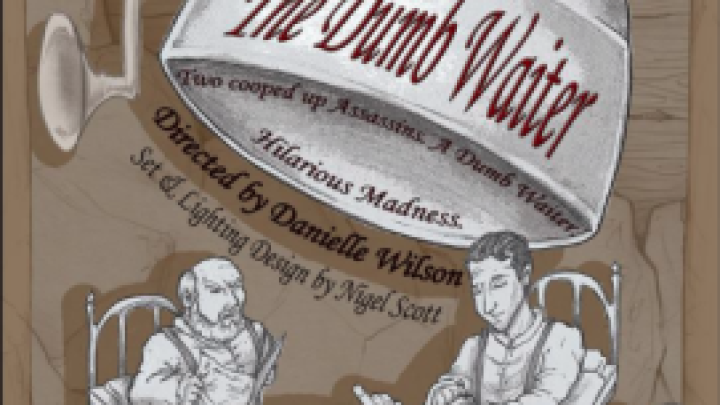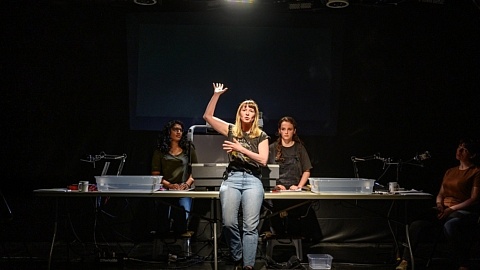Trigger warning: sexual assault, toxic gender roles. This review contains spoilers. Young women grow up learning a slew of double-standardized, mixed-signaled...
Pinning It Down: The Dumb Waiter at In The Soil
One of the most interesting things about In The Soil is its dedication to local art and artists. So strong is this dedication that they were happy to host the end of a much longer run of Stolen Theatre Collective’s production of The Dumb Waiter. The show Premiered April 10 at the Courthouse Theatre, and has already created a great buzz in the St. Catharines theatrical community. Naturally, we had to join in – especially since the 2014-15 class of DARTCritics were present during the rehearsal process and blogged about their experiences in the form of embedded criticism.
Nick met up with actors Colin Anthes (who we interviewed last year about his devised piece Once) and William Vickers (yes, THE William Vickers of Shaw renown) to discuss their experiences with Pinter, politics, and working in Niagara.
Nick: Why do you both chose to work in Niagara as actors and theatre artists?
Colin: St. Catharines is a bit of a dream for me. I came from Niagara falls, where there were no theatrical companies or not-for-profit arts organizations of any kind. Then I went to Toronto, but I wanted to have a bigger voice in a community; I felt like one more drop in the ocean in Toronto. St. Catharines already had ten fantastic performing arts companies, but still had room for me to have my own place and voice in the community. In St. Catharines I feel like I have a something to offer the community, both the creative community and the community at large. In Toronto I felt I had something to offer the other artists, but I didn’t feel like I had anything to do with Toronto itself. Here I have great inspiration from the companies around me, and the motivation to create work that resonates with the community.
Billy: What’s really nice about living here is all the arts organizations you can get involved with. I’ve done work with Lyndesfarne, Essential Collective Theatre, Niagara Symphony, Carousel Players, the Gallery Players, and now Stolen Theatre. Anytime I can get work locally I’ll take it. It’s nice to know you’re part of an arts community here.
Colin: I wish more people were aware of how many great companies are here. Growing up next door in Niagara falls I had no idea.
Billy: Come on down!
Nick: So why Pinter, and why now at In The Soil?
Colin: Danielle [Wilson, the director] picked up on the play’s potential of political metaphor that is actually very contemporary, despite the play being… How old’s the play?
Billy: Written in 55′, performed in 57′.
Colin: Yes! Aesthetically there are elements that ask, why that room? The answers must come from his [Pinter’s] time period. The tension of the drama, the humor, and the statements that the play makes, those are just as contemporary now as they would’ve been when Pinter was writing it.
Billy: It makes you ask, what’s going on “upstairs”.
Colin: Yes. Government surveillance is stepping up. Bill C-51 is on the table right now.
Nick: Now dumping into the play…
Colin: Dumping into the play?
Nick: Yes, dumping into the play.
Colin: Oh no!
Nick: Jumping into the play, can you talk about the challenges of working on a Pinter play? Have either of you worked on Pinter before?
Colin: It’s a first for both of us.
Billy: I jumped on the opportunity because I had never done one. The challenge of it is in the banter and circus nature of the piece, and keeping that raw. Its unique, I’ve never done anything like it.
Colin: On one hand there’s an element of a musical score.
Billy: Definitely.
Colin: But the idea of actors coming in with intentions, listening to each other, and the viscerality of it is all there as well. Nothing is substituted by the musicality. There’s almost two games being played at once.
Billy: You’re wearing two hats out there. It’s exciting!
Nick: Everything in Pinter is so important as well.
Colin: Yes. It’s so specific.
Billy: It’s so taut and so particular, that’s what’s exciting. Making that look easy, isn’t easy.
Nick: It’s definitely a challenging piece then?
Billy: I did Waiting For Godot about five years ago. It’s a very similar play and you can see the influences. Even though Godot is twice the length of Dumb Waiter, it’s an easier piece to do. In Godot you have more physical memory to rely on, because of all the games the characters play to escape the void. Whereas this play is more verbal and very lean. It’s great fun though!
Colin: Definitely.
Billy: Once you’re inside it you realize how great it is. You start to say the words, and think “of course I say this!” On the page it seems so disjointed and odd, but it makes perfect psychological sense. It’s actually a pretty easy script to memorize.
Colin: The repetition makes it difficult. But getting the sense of the play is not difficult.
Billy: Yes, it’s the repetition that makes you go “where the hell are we?” But as Danielle brilliantly pointed out, the play is actually built into four identical movements where huge shifts take place in the play. They’re marked by the discovery of the letter, the discovery of the dumb waiter, and the discovery of the speaking tube. And each movement is about eight pages long. It’s a fascinating structure.
Colin: Now that we’ve had a number of runs I feel I know how the play breathes. In terms of the structure of the play, I thought we had that pretty early on in the process. In the last couple of rehearsals Danielle said we were ready for an audience, and she was right. We had a structure so early because the play makes such great sense. But finding how each moment breathes takes some digging, and because it’s so specific, takes time to find.
Nick: So in order to find every moment you needed an audience?
Colin: Yes, especially with this production because the audience is so close. There are other beats that are discovered from the close proximity.
Billy: The space works so well with the claustrophobic nature of the play.
Nick: Have either of you worked in a space that small before? Did the space present additional challenges as well?
Billy: If anything it wasn’t a challenge, it made it easier.
Colin: It makes sense to have the audience there.
Billy: Yes, it’s never felt uncomfortable.
Colin: It would’ve felt uncomfortable, I think, to have attempted to project the intimacy of the piece into the larger house.
Billy: Pinter would have written it for a small space as well. It was only his second play.
Colin: In our space the audience breathes the rhythm of the play with us. They’re inside the beats.
Billy: I’ve learned to play the room more I think. I’m pleased with what we’ve found in the last four or five runs. The play has a spooky undertow to it that pulls you in and leaves you in the deep.
Nick: I wish you all the best on your future runs this week. Before we go can you both tell us what you’re most excited for at In the Soil this year?
Colin: I’m excited to do the show again!
Billy: I’m excited to do it at 10 pm. It’s going to happen around the same time the play might have actually occurred.
Colin: It’ll be nice to do it after a break as well.
Billy: Maybe we should go run it. Just once, over lunch?
Colin: Sure.
The Dumb Waiter plays its final show Saturday April 25 at 2pm at the Sullivan Mahoney Courthouse. Tickets are $10 or free with the Festival Pass.
Related Posts
Who am I?
The need for self-identification and self-actualization is an experience that many of us can relate to.
The Heels of Our Grandfathers by Cole...
Welcome back, DARTcritics readers! Leah here again! Did you miss me? Well, even if you didn’t, I am sure you missed reading our coverage of DLT’s Inferno....
Who am I? The need for self-identification and self-actualization is an experience that many of us can relate to. The Heels of Our Grandfathers by Cole...
Welcome back, DARTcritics readers! Leah here again! Did you miss me? Well, even if you didn’t, I am sure you missed reading our coverage of DLT’s Inferno....
Leave a Reply (Cancel Reply)
Twitter Feed
Blogroll
DARTcritics.com is partially funded by the Marilyn I. Walker School of Fine and Performing Arts, in support of student learning; experiential education; student professionalization; public engagement with the teaching, learning and production activities of the Department of Dramatic Arts; new ways of thinking; and the nurturing of links with our communities.







